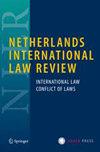武装团体提供赔偿的义务:习惯国际法下的规范?
IF 0.8
Q1 LAW
引用次数: 3
摘要
赔偿是纠正武装冲突受害者所受痛苦的一个关键因素。考虑到当代武装冲突的主要非国际性,以及武装团体占参与者的一半这一事实,似乎有理由质疑武装团体是否也应提供赔偿。从受害者的角度来看,无论犯罪者是国家行为者还是非国家行为者,对他们造成的痛苦都是一样的。在这种情况下,似乎有一种新的做法支持武装团体提供赔偿的义务,正如一些联合国报告所承认的那样。此外,也有武装团体承诺通过和平协定、单方面声明和行为守则向受害者提供某种形式的赔偿的例子。本文分析了最近的国际惯例,并审查了非国家武装团体在提供赔偿时可能被承认的任何潜在义务。更确切地说,这篇文章评估了武装团体实践的发展是否可以被视为对习惯国际法作出了贡献,并建议如何将这种实践与国家的实践结合起来加以权衡。报告还指出了武装团体在提供赔偿方面面临的挑战和限制因素。本文章由计算机程序翻译,如有差异,请以英文原文为准。
The Obligation to Provide Reparations by Armed Groups: A Norm under Customary International Law?
Reparations represent a key element to redress the suffering caused to victims of armed conflict. Taking into account the predominantly non-international nature of contemporary armed conflicts and the fact that armed groups represent half of the participants, it seems legitimate to question whether reparations should also be provided by armed groups. From the victims’ perspective, the suffering caused to them remains the same irrespective of whether the perpetrator is a state or a non-state actor. In this context, there appears to be an emerging practice supporting the obligation of armed groups to provide reparation, as acknowledged in some UN reports. In addition, there have been examples of armed groups committing to provide some forms of reparation to victims through peace agreements, unilateral declarations and codes of conduct. This article analyses the recent international practice and examines any potential duty by non-state armed groups that could have been recognised in the provision of reparations. More precisely, the article evaluates whether the developments in the practice of armed groups could be considered as contributing to customary international law and suggests how this practice could be weighted together with the practice of states. It also identifies challenges and limiting factors in the provision of reparations by armed groups.
求助全文
通过发布文献求助,成功后即可免费获取论文全文。
去求助
来源期刊
CiteScore
2.10
自引率
11.10%
发文量
23
期刊介绍:
The Netherlands International Law Review (NILR) is one of the world’s leading journals in the fields of public and private international law. It is published three times a year, and features peer-reviewed, innovative, and challenging articles, case notes, commentaries, book reviews and overviews of the latest legal developments in The Hague. The NILR was established in 1953 and has since become a valuable source of information for scholars, practitioners and anyone who wants to stay up-to-date of the most important developments in these fields. In the subscription to the Netherlands International Law Review the Netherlands Yearbook of International Law (NYIL) is included. The NILR is published by T.M.C. Asser Press, in cooperation with the T.M.C. Asser Instituut, and is distributed by Springer International Publishing. T.M.C. Asser Instituut, an inter-university institute for Private and Public International Law and European Law, was founded in 1965 by the law faculties of the Dutch universities. The Institute is responsible for the promotion of education and research in international law.

 求助内容:
求助内容: 应助结果提醒方式:
应助结果提醒方式:


